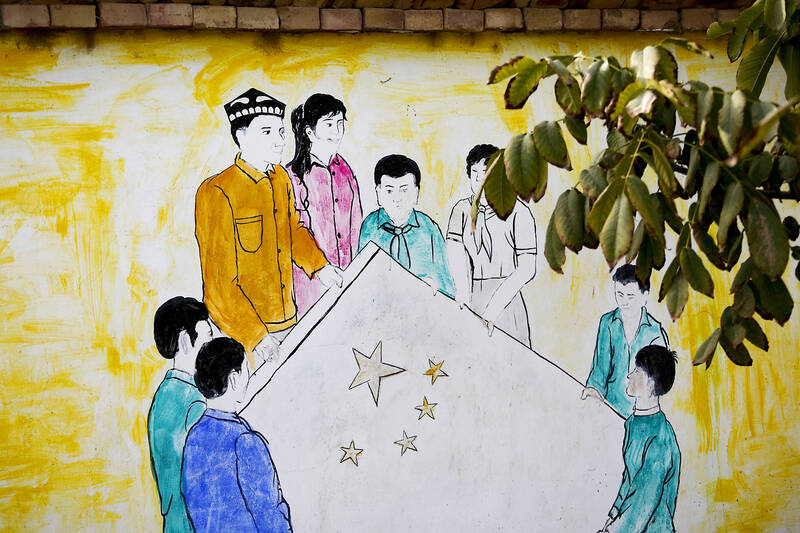Hundreds of Uighur villages and towns have been renamed by Chinese authorities to remove religious or cultural references, with many replaced by names reflecting Communist party ideology, a report has found.
Research published yesterday by Human Rights Watch and the Norway-based organization Uighur Hjelp documents about 630 communities that have been renamed in this way by the government, mostly during the height of a crackdown on Uighurs that several governments and human rights bodies have called a genocide.
The new names removing religious, historical or cultural references are among thousands of otherwise benign name changes between 2009 and last year. According to the two organizations that conducted the research, the apparently political changes, which mostly occurred in 2017-19, targeted three broad categories. Any mentions of religion or Uighur cultural practices were removed, including terms such as hoja, a title for a Sufi religious teacher, which was removed from at least 25 village names; haniqa, a type of Sufi religious building taken from 10 village names; and mazar, meaning shrine, which was removed from at least 41 village names.

Photo: AP
The authorities also changed names that referenced Uighur kingdoms, republics or leaders from before 1949 when the People’s Republic of China was founded. The report said there were no longer any villages in Xinjiang with the word xelpe or khalifa (ruler) or meschit (mosque) in their names.
Uighurs are a Turkic ethnic group mainly found in Xinjiang. They have long had a fractious relationship with Beijing, which accuses many of them of wanting to break away from Chinese rule.
The report said the new village names were typically in Mandarin Chinese and expressed a “positive sentiment, which the government wants Uighurs to embrace and express under the Chinese leadership.”
In 2018, Aq Meschit (White Mosque) village, in Akto County, was renamed Unity village, the report said. In 2022 the Karakax County village of Dutar — named for a Uighur traditional instrument — was renamed Red Flag village.
“This is part of the broader efforts by the Chinese government to conflate Islam with terrorism,” said Elaine Pearson, the director of Human Rights Watch’s Asia division. “They see anything Islamic or Arabic sounding as threatening, so they renamed these things to be more in mind with [Chinese Communist party] ideology.
“We’ve seen this also in the way mosques have been demolished, changed, altered. We’ve seen many different examples in the way the Chinese government uses this to violate aspects of free expression and cultural identity and religious freedom.”
Rayhan Asat, a Uighur human rights lawyer and senior fellow at the Atlantic Council, whose brother disappeared into the Xinjiang detention regime in 2016, told the Guardian the changes were part of Beijing’s “overarching objective to eradicate the Uighur culture and people entirely and create a system of apartheid.”
“The names of their villages serve not only as historical records but also embody the community’s ties, distinct town culture and values. The state-imposed erasure and replacement policy aimed to sever Uighurs from our history, culture and civilization.”
The practice of renaming locations — like many of the policies imposed in Xinjiang — was first done in Tibet. The Chinese government last year began referring to Tibet as “Xizang” on official documents. Since 2017 it has also issued official Chinese names for locations in Arunachal Pradesh, the disputed Himalayan region where China claims territory.
In Tibet and Xinjiang the increasingly militarized and surveilled environment makes it extremely difficult for information to come out about human rights abuses, and the Chinese government rarely responds to requests for information.
Pearson said: “Part of the reason we know this is happening is that in one case a woman released from a re-education facility tried to get a bus ticket home but found her village didn’t exist any more.”
Since launching its “strike hard” campaign against Uighur and other Turkic Muslims in 2014 in the name of counter-terrorism, the Chinese government has arbitrarily detained millions of people, in re-education camps and jails, criminalizing religious acts such as growing beards or reading the Quran. Others have been persecuted for having contact with the international diaspora or traveling overseas.
There is evidence of enforced mass labor transfer programs, enforced social re-education, torture and enforced disappearances, and coercive reproductive control.

On the final approach to Lanshan Workstation (嵐山工作站), logging trains crossed one last gully over a dramatic double bridge, taking the left line to enter the locomotive shed or the right line to continue straight through, heading deeper into the Central Mountains. Today, hikers have to scramble down a steep slope into this gully and pass underneath the rails, still hanging eerily in the air even after the bridge’s supports collapsed long ago. It is the final — but not the most dangerous — challenge of a tough two-day hike in. Back when logging was still underway, it was a quick,

Chinese Nationalist Party (KMT) legislative caucus convener Fu Kun-chi (傅?萁) and some in the deep blue camp seem determined to ensure many of the recall campaigns against their lawmakers succeed. Widely known as the “King of Hualien,” Fu also appears to have become the king of the KMT. In theory, Legislative Speaker Han Kuo-yu (韓國瑜) outranks him, but Han is supposed to be even-handed in negotiations between party caucuses — the Democratic Progressive Party (DPP) says he is not — and Fu has been outright ignoring Han. Party Chairman Eric Chu (朱立倫) isn’t taking the lead on anything while Fu

There is a Chinese Communist Party (CCP) plot to put millions at the mercy of the CCP using just released AI technology. This isn’t being overly dramatic. The speed at which AI is improving is exponential as AI improves itself, and we are unprepared for this because we have never experienced anything like this before. For example, a few months ago music videos made on home computers began appearing with AI-generated people and scenes in them that were pretty impressive, but the people would sprout extra arms and fingers, food would inexplicably fly off plates into mouths and text on

From censoring “poisonous books” to banning “poisonous languages,” the Chinese Nationalist Party (KMT) tried hard to stamp out anything that might conflict with its agenda during its almost 40 years of martial law. To mark 228 Peace Memorial Day, which commemorates the anti-government uprising in 1947, which was violently suppressed, I visited two exhibitions detailing censorship in Taiwan: “Silenced Pages” (禁書時代) at the National 228 Memorial Museum and “Mandarin Monopoly?!” (請說國語) at the National Human Rights Museum. In both cases, the authorities framed their targets as “evils that would threaten social mores, national stability and their anti-communist cause, justifying their actions